
Possible comorbidities and other risk factors in advanced renal cell carcinoma that would affect potential treatment regimens.

Your AI-Trained Oncology Knowledge Connection!


Possible comorbidities and other risk factors in advanced renal cell carcinoma that would affect potential treatment regimens.

Before closing out their discussion on intermediate-risk RCC, experts review frontline triplet combinations and possible treatment options following relapse after nivolumab-ipilimumab.
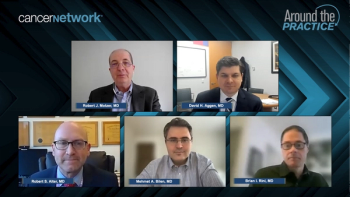
Comprehensive discussion on how to best treat patients with renal cell carcinoma and brain or bone metastasis.
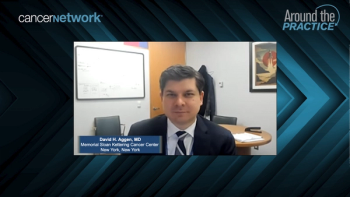
Shared insight on the adverse event profile of immunotherapy combination regimens in renal cell carcinoma, including advice on when it is appropriate to discontinue therapy.

Expert perspectives on the clinical scenario of a patient with intermediate-risk renal cell carcinoma, who is managed with the immunotherapy combination of ipilimumab and nivolumab.
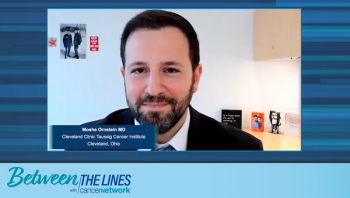
A look at the factors considered in choosing an appropriate combination treatment for advanced renal cell carcinoma.

Drs Rana McKay and Tom Powles debate the merits of different first-line combination treatment regimens for renal cell carcinoma.

A brief discussion on available treatment options after patients progress following frontline TKI/IO therapy with favorable-risk renal cell carcinoma.
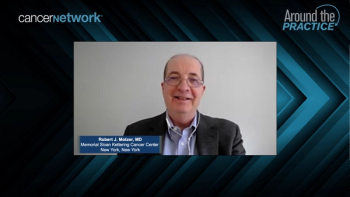
A comprehensive review of the adverse event profiles of TKI/IO regimens used in favorable-risk renal cell carcinoma and how these can be managed with dose adjustment.

Expert insights on selecting the appropriate patients and dose for treatment with the lenvatinib plus pembrolizumab regimen in patients with renal cell carcinoma.

Experts open their discussion on RCC by reviewing the clinical scenario of a patient with favorable-risk disease who is treated with the TKI/IO regimen of lenvatinib and pembrolizumab.

Oncologists give their initial impressions about the results of a clinical trial studying doublet combination therapies for advanced renal cell carcinoma.

Robert J. Motzer, MD, presents data examined in the article, “Lenvatinib Plus Pembrolizumab or Everolimus for Advanced Renal Cell Carcinoma.”

Brian Rini, MD, discussed abstracts presented during the 2021 ESMO Congress that will have an immediate impact on prostate cancer.
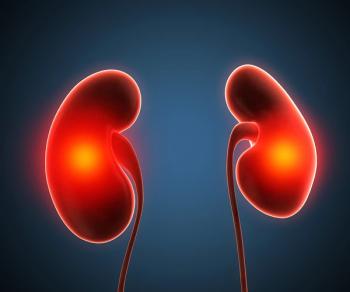
Brian I. Rini, MD, detailed the focus, goals, and key end points of a 3-arm, phase 3 trial comparing MK-1308A or belzutifan plus lenvatinib and pembrolizumab to the control of lenvatinib and pembrolizumab alone to treat patients with advanced clear cell renal cell carcinoma.

The authors present an interesting case of a very rare renal neoplasm, malignant epithelioid angiomyolipoma (AML), which belongs to a family of mesenchymal tumors known as perivascular epithelioid tumors (PEComas).

In the year 2009, an estimated 70,980 new cases of bladder cancer will be diagnosed in the United States, and approximately 14,330 patients will die of this disease.Urothelial cancers encompass carcinomas of the bladder, ureters, and renal pelvis; these cancers occur at a ratio of 50:3:1, respectively. Cancer of the urothelium is a multifocal process. Patients with cancer of the upper urinary tract have a 30% to 50% chance of developing cancer of the bladder at some time in their lives. On the other hand, patients with bladder cancer have a 2% to 3% chance of developing cancer of the upper urinary tract. The incidence of renal pelvis tumors is decreasing.

Recent advances in the understanding of the biology of renal cell carcinoma (RCC) have been translated into clinical treatment options in metastatic disease.

Sunitinib malate (Sutent, SU011248) is an oral multitargeted tyrosine kinase inhibitor used for treatment of renal cell carcinoma and gastrointestinal stromal tumor. We report a case of a patient who developed Guillain-Barré syndrome after initial treatment with sunitinib, with recurrent symptoms upon reintroducing the drug. This is the first report of such an effect. The literature on chemotherapy-induced Guillain-Barré syndrome is also reviewed. Oncology providers should be aware of this rare but potentially serious possible adverse effect of sunitinib.

Drs. Wolchok and Motzer provide a succinct, timely review of the diagnosis and management of renal carcinoma. The article leads us to ask a number of questions: What factors account for the major increase in the incidence of renal carcinoma? How has surgical management evolved with the advent of newer operative techniques? What role, if any, does chemotherapy play in the treatment of this disease? What is the current status of and future outlook for immunotherapeutic approaches?